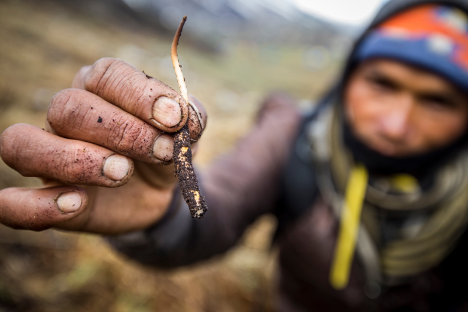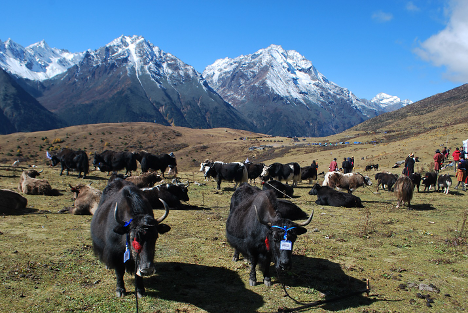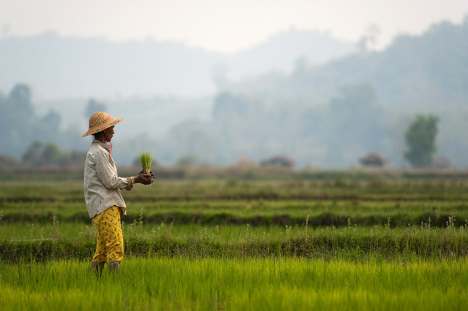– by Sunita Chaudhary, Biraj Adhikari, and Kesang Wangchuk

“Nature holds the key to our aesthetic, intellectual, cognitive, and even spiritual satisfaction.” – Edward Osborne Wilson
In the Hindu epic Ramayana, Hanuman, the divine monkey god, rushes to the Himalaya to fetch a medicinal herb to save Lakshmana’s life. Hanuman carries back an entire mountain full of medicinal herbs, among them the Sanjeevani plant, which saves Lakshmana from certain death. Ramayana as it turns out has for centuries – along with folklores, mythical stories, traditional beliefs, and cultures around the globe – been showing us the value of nature not only for sustaining life but also for the solutions it provides to complex problems and uncertainties. International Biodiversity Day 2020 is being celebrated under the theme “Our solutions are in nature”, and provides the perfect opportunity for us to reflect on, value, and sustainably utilize the restorative and replenishing power of nature.
Since time immemorial, nature has been the basis of our life, development, and adaptation to change. From catering to our ever-growing demand of food and water to helping lessen global warming by absorbing and storing carbon to enriching our environment and providing a sense of community, nature has been crucial for sustaining life on Earth. Nature not only provides humankind with basic necessities but also nurtures us physically, intellectually, and spiritually. For instance, recent research on the Japanese practice of shinrin-yoku or “forest bathing” – which is just being in the presence of trees – indicates its potential to improve intellectual and spiritual wellbeing.
Nature gives, but we snatch
Expanding human activities over the past centuries have been exponentially ravaging nature. With the onset of the Industrial Revolution in the mid-18th century, we have made remarkable progress in terms of accessibility to basic necessities, improvement in health and education, and other materialistic services – but the drain on natural resources has been massive. Nature has been exploited beyond its limits and boundaries: almost half of the forest area has been lost, the population of wildlife has decreased by 60%, and a third of the world’s arable land has been converted to deserts.
This burden on nature is resulting in a massive loss of biodiversity. The degrading health of ecosystems and the services they provide not only undermine nature’s ability to support wellbeing and economic growth but also make us vulnerable to different changes, including climate change and disasters. A vivid example of this is the ongoing COVID-19 pandemic, which is inextricably linked with nature and humans. The loss of biodiversity and destruction of nature is directly linked to most zoonotic diseases, including the emergence of COVID-19, which has brought the world to a standstill and ushered in a period of great uncertainty.
Nature-based solutions are the future

Solutions to much of what ails society today can be found in nature. Nature-based solutions (NbS) are those actions which encourage the protection, sustainable management, and restoration of natural or modified ecosystems to address societal challenges while simultaneously supporting human wellbeing and biodiversity benefits. Innovations, particularly in technology and economy, supported by nature have been gaining increasing attention recently, including endorsement by the Secretary General of the United Nations. NbS are seen as a crucial step towards climate change adaptation by the United Nations Framework Convention on Climate Change and other global agencies, including the Global Center on Adaptation. Sustainable Development Goals have been specifically framed to enhance NbS. Renewable energy, clean transport, recycling, and circular economy are a few NbS which contribute to economic growth without burdens on nature.
Similarly, the transboundary landscape approach is an innovative approach that uses the NbS framework to tackle challenges shared by people and ecosystems beyond political boundaries. An example of the approach is well reflected in ICIMOD’s Regional Programme on Transboundary Landscapes in the Hindu Kush Himalaya (HKH), which aims to conserve and sustainably use natural resources for generating co-benefits to nature and people at the scale of larger landscapes defined by ecosystems. The programme brings together not only countries but also diverse stakeholders to cooperate and work towards the common goal of balancing conservation and sustainable development. This is important not only for the conservation of biodiversity (especially flagship species and wide-ranging species) but also for improving the adaptive capacity of communities to changes.
Equally important is the river basin approach, which considers upstream–downstream linkages. For example, the restoration of natural forests upstream will not only increase carbon sequestration but benefit the downstream area with nutrient-rich soil and provide essential services like water for drinking and irrigation, habitat for a variety of species, and fresh air. There are countless examples of NbS proving to be effective long-term and cost-efficient approaches to tackling climate change and other problems. From countering droughts through the management of watersheds in El Salvador to the greening of the vast Kubuqi Desert in China, NbS have solved major problems faced by societies around the world.
NbS for the mountains

NbS are particularly important for the mountains. Mountain ecosystems host half of the world’s biodiversity hotspots and are home to ancient indigenous cultures and ethnic groups. These ecosystems provide diverse services such as biodiversity and freshwater to half of humanity. An example of this is the HKH, which directly supports the lives and livelihoods of 240 million people living in the mountains and provides water to 1.65 billion people downstream. The diversity and rich resources of the mountains provide immense opportunities for nature-based solutions.
For instance, utilizing the elevation gradients of mountains to increase agrobiodiversity, revisiting traditional farming techniques, using high-river gradients to properly manage irrigation, and revitalizing grasslands by conserving mountain wetlands can greatly counteract the negative effects of climate change in the region. The numerous positive results from reviving traditional farming, promoting local food systems, value chain development for mountain produce, and restoration have highlighted the significance of NbS even more. Of particular importance is the integration of rich traditional knowledge and practices in agriculture, forest and rangeland restoration, and spring rejuvenation. For example, jholmol – a bio-pesticide and nutrient supplement – contributes to improving plant health through effective disease control. The exemplary forest restoration efforts by women from the Dumrithumka Adarsha Mahila Community Forest User Group in Udayapur, Nepal has received national and international recognition, including the 2017 Birdlife Nature’s Heroes Award. Similarly, the spring rejuvenation is an exceptional example of NbS for climate change adaptation and ensuring future water security.
Indigenous knowledge is vital for NbS in mountains
Knowledge generated and accumulated by indigenous communities in the HKH for generations has helped them adapt to climate-related and other stressors. Traditional practices supported by nature help in not only dealing with stressors but also managing nature sustainably.
For example, local communities in mountainous Nepal plant bamboo to regulate runoff and conserve soil in gullies and employ traditional irrigation practices along contours. Indigenous communities in northeast India and Myanmar have conserved crop diversity and maintained knowledge about wild edible plants that are important sources of nutrients and contribute to food and nutritional security of households in the mountains.
Similarly, the mountain communities of Badakhshan Province in Afghanistan have combated the accelerated removal of medicinal plants in their region which could have severely impacted health security in the rural province by revitalizing the indigenous knowledge of medicinal plants and traditional medicine practices. Therefore, an integrated approach combining the rich traditional knowledge and modern technology, and privileging a role for local communities and institutions, is important to tap into the numerous solutions provided by nature to better adapt to climate and other changes.
This takes us back again to the anecdote of Hanuman and the lifesaving herbs found in the Himalaya. This is still relevant today: Nature is a lifesaver and should be protected for posterity. The indigenous traditional knowledge systems supported and nurtured by nature could be integrated into the NbS approach to generate co-benefits for both nature and people.
So let’s join our hands to protect and nurture nature for our shared prosperity and future generations. Happy International Biodiversity Day 2020: Our solutions are indeed in nature!
Authors are ecosystems and biodiversity specialists at the International Centre for Integrated Mountain Development (ICIMOD)
The opinions, beliefs and viewpoints expressed by authors, news service providers on this page do not necessarily reflect the opinions, beliefs and viewpoints of Hill Post. Any views or opinions are not intended to malign any religion, ethnic group, club, organization, company, or individual.
Hill Post makes no representations as to the accuracy or completeness of any information on this site page.


